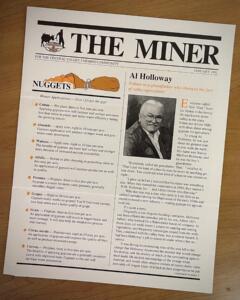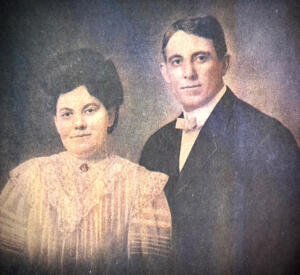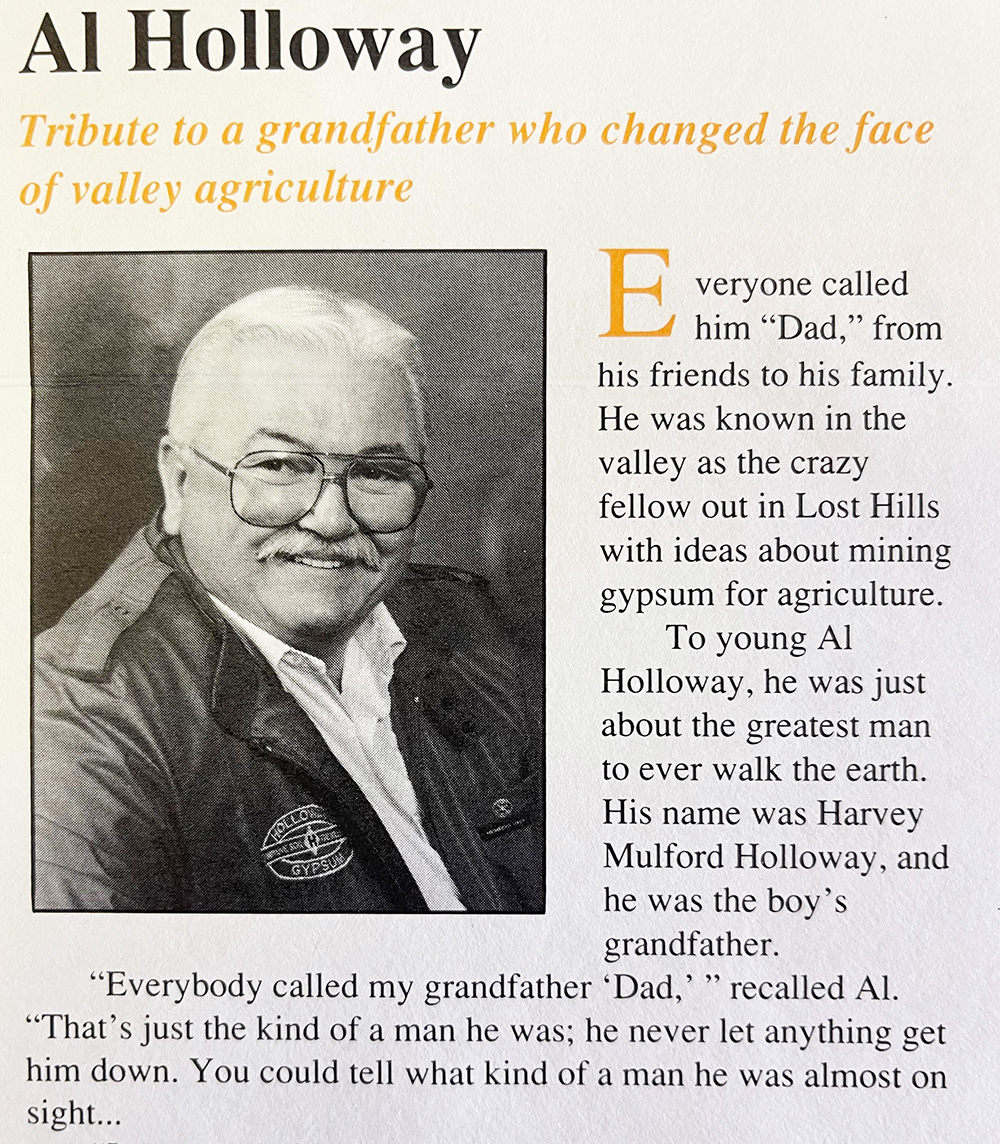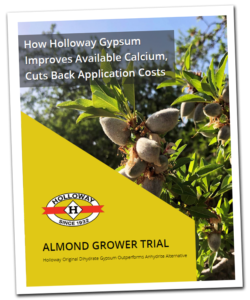As part of Holloway’s 90th anniversary celebration, we’re sharing past articles and photos from previous generations of the Holloway team. This week, we share an article from former president and chairman of the board Al Holloway, writing about his grandfather and company founder, Harvey Mulford Holloway:
Al Holloway: Tribute to a grandfather who changed the face of Valley agriculture
The Miner, January 1991
 Everyone called him “Dad,” from his friends to his family.
Everyone called him “Dad,” from his friends to his family.
He was known in the valley as the crazy fellow out in Lost Hills with ideas about mining gypsum for agriculture.
To young Al Holloway, he was just the greatest man to ever walk the earth.
His name was Harvey Mulford Holloway (H.M. Holloway), and he was the boy’s grandfather.
“Everyone called my grandfather ‘Dad,’” recalled Al in the January 1991 edition of The Miner. “That’s just the kind of man he was; he never let anything get him down. You could tell what kind of man he was almost on sight…
“I great up before I realized that his name was something else. When they named the corporation in 1944, they named it ‘H.M. Holloway Inc.’ – and I didn’t know who that was!”
Who that was was a man who came to Lost Hills as an oilfield caretaker during the Depression of the early 1930s and stayed to found a new industry – mining gypsum for agricultural use.

Holloway Founder Harvey M. Holloway and his wife, Mary.
It’s quite a story.
Originally a Los Angeles building contractor, Holloway had been offered the caretaker job by his son, Albert (Al’s father), who worked for a Bakersfield-based oil company. In those days, oil wells weren’t subject to capping and sealing regulations, and frequently natural gas seeped from the wells. This, combined with the valley heat, was a volatile hazard. It had been Holloway’s job to sound an alarm when a fire occurred.
It was during reconnoitering trips of the area left to his charge that Holloway discovered the mineral that would change his destiny, and the destiny of much of the surrounding agriculture lands. He studied outcroppings of the strange white material, and would often observe owners of nearby farms come and carry off wagon loads of it back to their properties to put on their vineyards and tree crops.
Holloway’s curiosity prompted him to take samples of the material to Bakersfield for analysis and assay. Frank Hornkohl, owner of Hornkohl Laboratories, told him the substance was calcium sulfate, or gypsum, a mineral known to neutralize alkali in soil and improve water penetration.

Former Chairman of the Board Al Holloway.
Holloway concluded that the substance might possibly have a commercial value, so he discussed the idea with his son, Albert (Al’s father). With Albert’s assistance, he acquired a lease for a 40-acre parcel of land and, in 1932, launched his gypsum mining operation with not much more than a pick and shovel.
Al remembers those early days with great fondness. He would stay with his grandfather in the “doghouse,” a structure on a wooden oil derrick originally built as a changing shed for the crew but ingeniously converted by the senior Holloway into comfortable living quarters. As Al recalls, it was quite comfortable, thanks to his grandfather’s carpentry skills and creative use of natural gas. Remembers Al: “He captured the gas, regulated it, and used it for everything from heating water to heating the building itself.
Cooling the structure was another story. Explained Al: “The heat was so ad that you couldn’t keep a loaf of break out there, so my grandfather went into Lost Hills every day and bought a box or two of Rye Crisp in place of bread. Somehow he discovered that the boxes had some insulating properties, so every time we finished a box he would tack it up on the wall. Pretty soon the whole building was lined with Rye Crisp boxes, and it stayed about 15-20 degrees cooler!”
In 1936, circumstances separated Al and his grandfather. That year Al’s father died of complications resulting from surgery of a ruptured appendix. For a while, eight-year-old Al stayed with his grandfather, but he was eventually sent to the Southern California Military Academy in Long Beach, where he entered the third grade. He continued to spend all of his vacations with his grandfather, however, learning the mining operation.
After military school, Al was offered a small grant to play football at the University of Southern California. With his grandfather’s financial help, supplemented by a part-time job in Los Angeles and summers working the mine in Lost Hills, Al graduated from USC and went on to officer candidate school He became a commissioned officer in June of 1950, just before the Korean War broke out, and spent the next three years on active duty.
It was at this point that Al, then promoted to captain, had to make a decision between a career I the Marine Corp or the family business. His grandfather had died several years earlier, in 1947, at the age of 78, and Al felt a responsibility to carry on his grandfather’s work. He explained: “I felt and obligation to my grandfather’s memory. He was my favorite person of all time and the man who had the most influence in my life.”
In the years since, Al held “just about every title in the company,” from secretary to president, and worked at every job from “shoveling to operating the equipment.” (At the time of this article in January 1991), Al is chairman of the board of directors of H.M. Holloway.
Al credits his experience in the Marines as “reflecting in everything I do in my life.” He continued to remain active in the Marine Corps Reserve, dedicating a total of 41 years of service and moving up through the ranks until retiring as a full colonel in 1988.
Long involved in community service, Al has served on the boards of two water districts for over 30 years, the Kern-Tulare Water District and the historic Rag Gulch Water District east of Delano. He has also been on the board of the California State University, Bakersfield Foundation for the past 20 years and a member of Rotary Club for the past 35 years.
One of his joys is singing lead in the “Class of 45,” a barbershop quartet which performs regularly throughout the Kern County area. The quartet recently recorded a radio commercial promoting Holloway’s gypsum, which is currently airing on local radio stations. Al and his wife, Judy, a professional photographer, live in Porterville. He has six grown children.
Editor’s Note: Albert Hale Holloway, Chairman of the Board of H.M. Holloway, Inc., passed away on August 26, 2003, in Visalia, Calif. He was 75.
For more on Holloway’s history and its 90th anniversary celebration, visit HollowayAg.com/90.
Join Over 800 Companies Using Holloway Today.
Or Become Part of The Holloway Group to Further Your Career.

